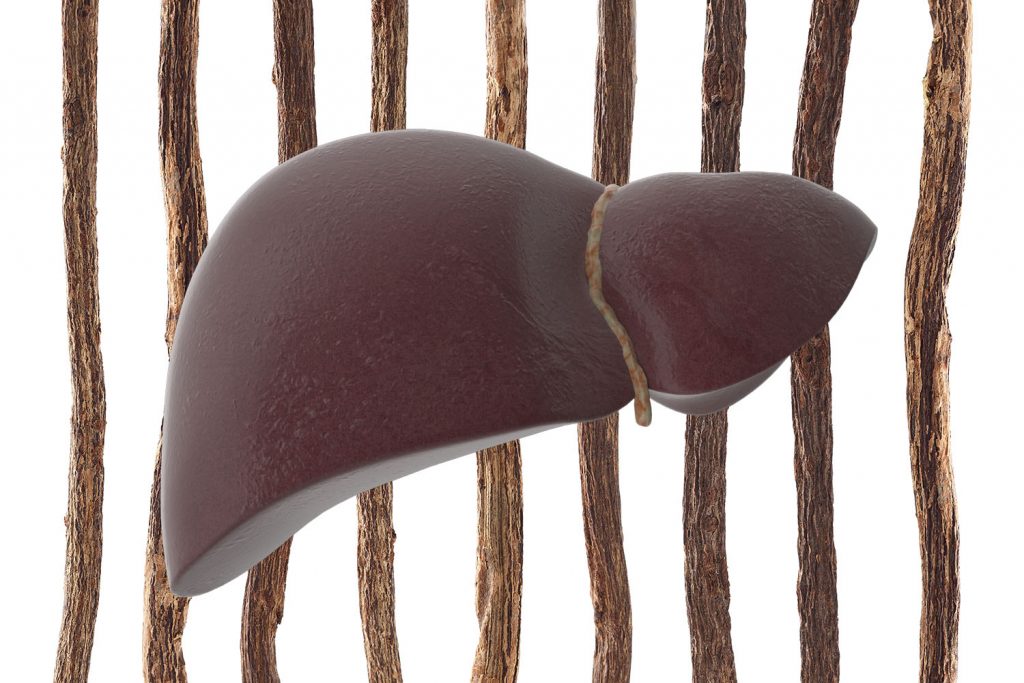05 Apr Liver damage by mycotoxins? Plant extracts come to the rescue!

The liver is one of the most metabolically active organs, being involved in key digestive, metabolic and excretory activities. Its function can be altered when the animal is exposed to toxic compounds such as mycotoxins, which is more frequent in animals with long lifespans.
Types of mycotoxins that produce liver damage
Aflatoxins are the best known hepatotoxic mycotoxins. Low levels of aflatoxins do not impair performance but reduce the concentration of albumin and total proteins in the blood, a sign that protein synthesis in the liver is negatively affected. At higher levels, aflatoxins induce hepatocyte damage, which results in necrosis or in cellular dysfunction.
Fumonisins interfere with the synthesis of sphingolipids. Sphingolipids are a class of lipids found in cell membranes, especially in tissues located in liver, lungs, heart, brain and nerves. The disruption of sphingolipid metabolism results in disturbances of cellular processes such as cell growth, differentiation, morphology, permeability and death. Hepatic injury is dose- and time-dependent.
Ochratoxin A induces liver inflammation and necrosis. The precise mechanism of toxicity is not yet known, but it is suspected to be related to oxidative stress.
T-2 toxin causes the death of the hepatocytes by producing reactive oxygen species (ROS) that lead to oxidative damage in the mitochondria.
Plant extracts with hepatoprotective effects
Botanicals have been used traditionally for the prevention and treatment of liver diseases.
Clinical and basic scientific research have confirmed that some plant extracts can protect farm animals against the negative consequences of mycotoxins in the liver.
The mechanisms of action of hepatoprotective phytogenics are the following:
- Protection of hepatocytes from cellular death, through the neutralization of the cytokine TNF-α and the enzyme caspase-3.
- Neutralization of free radicals and relieve of oxidative stress.
- Antiinflammatory effect (Regulation of the genetic expression of inflammation-related factors)
- Induction of mycotoxin detoxification by increasing the activity of cytochrome P450s enzymes.
- Promotion of hepatocyte growth and regeneration of liver injuries.
Phytogenics with hepatoprotective effects can be used routinely for the prevention of liver damage or to promote liver regeneration when animals have already been exposed to mycotoxins.
Products of choice
BioShield© is a complete solution that protects your animals against toxicity by mycotoxins. It includes:
- Broad spectrum mycotoxin protection (silicates with mycotoxin binding function)
- Phytogenics that preserve liver health, safeguard gut health and activate the immune system.
PhytoLiv© is an oral emulsion that contains essential oils, bioactives and vitamins with high antioxidant power. PhytoLiv© is especially useful in the following cases:
- In birds at risk of liver diseases, such as fatty liver, toxins or infections.
- To counteract the negative effects of feeding with oxidized fats or feed contaminated with mycotoxins and heavy metals.
- Before, during or after periods of stress, such as heat stress, vaccination, stressful management practices, diseases, etc
- To improve the taste, color and shelf life of meat and eggs; to increase eggshell quality whenever eggshell defects are related to poor liver function.
- To improve sperm quality and hatchability in breeders.
- To enhance growth, productivity, and efficiency.
PhytoMax© is a combination of vitamins, chelated calcium, microminerals and essential oils to be given through drinking water. It is intended for layers and breeders to:
- Maintain the levels of calcium and magnesium needed for optimal egg production.
- Reinforce skeletal health.
- Prevent cage fatigue.
- Stimulate the hepatic metabolism and the immune system.
- Improve the quality of the egg and the health of day-old chicks.
- Avoid the drop of the laying rate produced by stress (management, vaccines, hot weather, etc…)
- At the start of the laying period, to boost productivity.
- Prolong the productive life of the hen.
Do not miss any of our articles!
Subscribe to our monthly newsletter

Certain health statements may not be applicable in your region.

